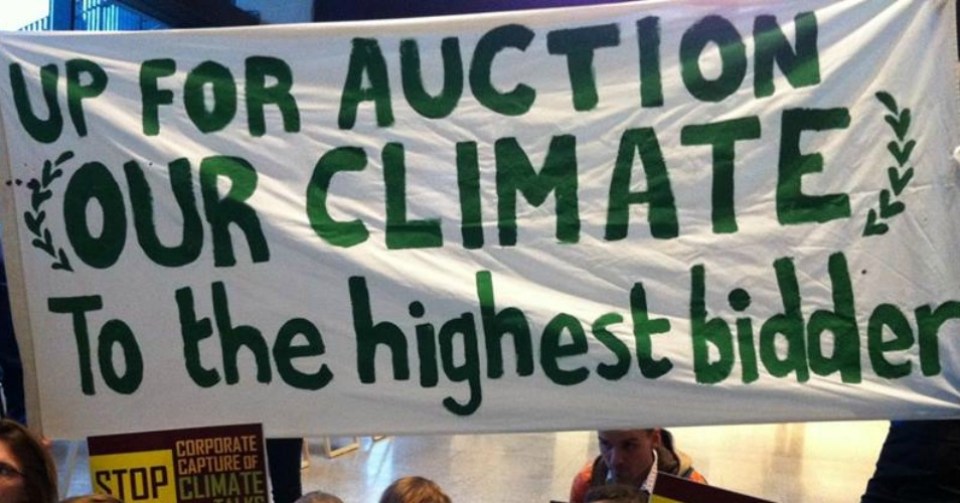
Bonn, 8 Nov (T Ajit) — On the 2nd day of the ongoing climate talks in Bonn, developing countries called for emphasis to be given to a particular finance issue dealing with quantitative and qualitative information on projected levels of public finance by developed countries under the Ad Hoc Working Group on the Paris Agreement (APA) of the UNFCCC.They were of the view that the issue which related to finance was not progressing at all and expressed concerns over the scheduling of conflicting consultations going on finance-related issues which posed difficulties for the G77 and China.
The APA had an opening plenary morning of 7 Nov, which was followed by a contact group which launched work on various agenda items. (See separate article on this.)
Informal consultations on several matters of the APA agenda relating to the implementation of the PA saw discussions among co-facilitators and Parties on how to take the work forward in order to prepare a negotiating text on the issues.
The unhappiness among developing countries on the finance issue arose when Parties met at informal consultations on the matter of ‘Modalities for biennially communicating finance information on the provision of public financial resources to developing countries in accordance with Article 9, paragraph 5 (of the Paris Agreement)’.
(Article 9.5 reads: ‘Developed country Parties shall biennially communicate indicative quantitative and qualitative information related to paragraphs 1 and 3 of this Article, as applicable, including, as available, projected levels of public financial resources to be provided to developing country Parties. Other Parties providing resources are encouraged to communicate biennially such information on a voluntary basis’.
Paragraph 1 says that developed countries shall provide financial resources to developing countries…; paragraph 3 says developed countries should continue to take the lead in mobilizing climate finance…)
The Article 9.5 issue is being handled under agenda item 8 of the APA, which discusses what Parties refer to as the ‘homeless’ or ‘orphaned’ issues.
(In Paris in 2015, the 21st session of the Conference of the Parties (COP 21) assigned various tasks related to the PA implementation to several bodies, which included the APA, and the Subsidiary Bodies of the Convention among others. There were several matters that were not assigned to any of the bodies, which Parties referred to as “homeless”. Modalities for biennially communicating finance information on the provision of public financial resources to developing countries in accordance with Article 9.5 is one of the homeless issues, which is being discussed in the APA. For more information, read this TWN Update.)
During the APA contact group, China emphasized the importance of the Article 9.5 as a “life and death” issue for developing countries.
China said the issue would impact all the other elements under negotiations in the APA, and urged APA Co-chairs Sara Baashan (Saudi Arabia) and Jo Tyndall (New Zealand) to allocate more time to the issue and to appoint two co-facilitators so there could be dedicated discussions through informal consultations on the matter.
China also called for an informal note to be produced by the appointed co-facilitators on the issue. It said that such mode of work would be consistent with the approach followed for the other APA agenda items, where each item was put in charge of two co-facilitators who conducted informal consultations and produced informal notes to capture the discussions during the informal consultations.
India, Saudi Arabia and the African Group also supported China.
India stressed that how the issue was taken forward was crucial as it would have a bearing on the entire design of the Paris package. “The issue requires adequate space. We know we are developing guidelines for global stocktake, transparency arrangements and implementation of nationally determined contributions. Information (on quantitative and qualitative information on projected levels of public finance by developed countries) is very relevant for developing countries as this would contribute to each and every agenda item listed under negotiations,” it said further.
India also said that there is a need to have proper co-facilitation on the issue, and said that since the Paris package is about developing modalities, procedures and guidelines, there was an urgent need to develop modalities for the issue at hand.
Saudi Arabia supported China and said that the production of an informal note or a tool that captured progress would be helpful in assessing and ensuring overall progress.
In response, Tyndall who presided over the contact group said that the Co-chairs would look into the issue during the informal consultations on its agenda item 8, which was scheduled later in the day.
However, later in the day, when the informal consultations convened, it was marred by poor process as a result of a clash between APA agenda item 8 and an item on “Budget performance for the biennium 2016–2017” under the agenda of the Subsidiary Body for Implementation (SBI), also a highly contested issue. (For more on the issue, see TWN Update.)
Baashan presided over the informal consultations. She proposed that Parties discuss the issue of modalities for biennially communicating finance information on the provision of public financial resources to developing countries in accordance with Article 9.5
She informed Parties that it was clear from previous discussions (at previous sessions) that there was no consensus on the issue.
She said that some Parties were of the view that the COP could mandate the APA or the SBI to undertake work on the possible additional matter; other Parties considered no additional mandate was necessary given that the work was already happening under the COP Agenda Item 10-f, which relates to “Process to identify the information to be provided by Parties in accordance with Article 9, paragraph 5, of the PA”; while some Parties did not agree that the COP agenda item addressed the issue at hand.
To take discussions forward, Baashan posed the following two questions to Parties:
“(i) What are those specific additional procedural matters concerning Art 9.5 that are not being addressed by the COP under its agenda item 10 (f) and (ii) What is the appropriate forum for considering these additional procedural matters”
However, there were very few finance negotiators from developing countries in the room.
China, therefore, requested that the informal consultations discuss the “non-finance issue” because the finance coordinator of the G77 and China and several finance negotiators from developing countries were not present in the room.
Baashan acknowledged the issue raised by China and spoke about scheduling difficulties given that so many bodies were meeting at the same time.
She also said that the idea was to have an initial exchange of views and Parties could reflect on the issue again at a subsequent session.
In response, however, the United States (US) dived straight into substance and said that the COP was undertaking the work and that work should continue through 2018.
Responding to the Co-chairs’ questions, the US said that no additional matters needed to be addressed in relation to the issue.
Baashan took note of the US’s comments but wanted Parties to first reflect on whether they should proceed with the discussions on the agenda item or not.
In response, Switzerland said that “under this agenda item, we are supposed to discuss whether we should discuss substance. We do not need finance experts here for that,” said Switzerland.
Egypt responded to Switzerland and said that Article 9.5 was a pure finance issue and that they should not be discussing the finance issue in the absence of G77 and China coordinator.
Australia responded to China’s proposal and said that the discussion on the only non-finance item would not work because their NDC experts were not in the room either. It added, however, that Parties were not there to discuss any substantive issue within the theme and they were only discussing whether work was progressing elsewhere and Australia was of the view that work on the issue was being conducted.
China said it did not agree with Switzerland that Parties were not there to discuss substance, and pointed to other delegations saying they had their finance experts in the room. “The only finance coordinator missing is G77 and China coordinator on finance,” said China and stressed that the questions posed by the Co-chairs were very much related to substance.
The Co-chairs then consulted among each other and acknowledged that it would be difficult to engage in 4 out of the 5 finance items without finance negotiators and assured Parties of doing their best to avoid clashes among similar topics in the future.
As an alternative strategy, the Co-chairs took Parties through the questions they had prepared on the remaining 4 homeless matters to take discussions forward at the current session. Baashan also said that the questions would be put up on the website.
It was close to 6 pm then, towards the end of the session. A few more negotiators (from South Africa and Saudi Arabia) had joined the informal consultations just a few minutes before the session was to end.
South Africa provided the rationale for substantive discussions on the item and said that the COP item 10-f was limited in scope in that it was restricted to defining the information. “We had put forth a proposal in relation to the modalities of communicating the information. So, this is not a procedural issue,” said South Africa. South Africa also delved into the substance of the discussions and outlined elements, which it said should be reflected as subheadings. It also supported the proposal made by China during the APA contact group earlier in the day.
Saudi Arabia said that the process had to be transparent and inclusive and expressed alarm that Article 9.5 issue was being discussed at the same time as budget. “This is a very important discussion for us and this (clashing of sessions) is not acceptable. It is poisoning the atmosphere on the very second day of negotiations,” it said Saudi Arabia and asked of the Co-chairs to find a solution and raise the issue with the COP Presidency and UNFCCC Bureau that Parties were unable to cope with such scheduling. “We know Annex I Parties come with a large number of negotiators but Non-Annex I Parties have small teams and we cannot split,” said Saudi Arabia.
Baashan responded that the situation was quite unfortunate and that the Co-chairs would try their utmost to make sure there would be no clashes but that scheduling had indeed become a predicament.
Egypt proposed that since 4 of the 5 homeless items were related to finance, it would help to know beforehand which issue would be taken up at which informal consultation so that Parties could coordinate. Baashan acknowledged the comment.




